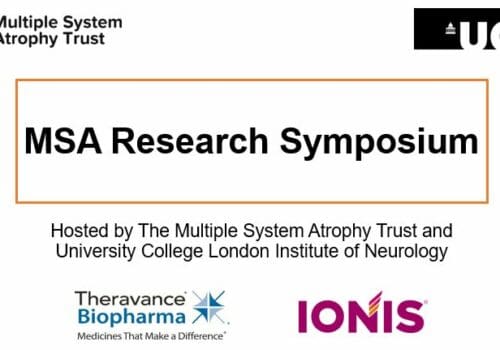From better diagnosis to cure
Our Scientific Advisory Panel member, John Telford looks at the direction current research is taking in part one of his blog…
As I write this, I note that there has just been an MSA conference in Innsbruck, Austria and there will be another in Salerno in April *. On looking at their programmes I see that there are certain recurrent themes. These indicate the latest directions research is taking. I want to describe what these themes are and why I think they are significant. In this blog I will deal with ‘biomarkers’ and in a blog after Easter I will look at the all important ‘Cause and Cure’.
Biomarkers. As you know, it is very difficult to distinguish MSA, particularly the parkinsonian form, from Parkinson’s disease itself, especially early on. The search is on, therefore, for reliable biomarkers as they are called. These are observable biological characteristics that would indicate with a good deal of certainty that the condition someone has is MSA and not something else. Ideally a biomarker would also show what stage the condition had reached.
One approach is to see if something can be found in the blood, in other bodily fluids or in samples of tissue that can definitely show that it is MSA – or can rule it out.
Another approach is to scan the brain and look for something characteristic of MSA . MRI scans have been used for some years but there have been some important advances recently that could make diagnosis more certain. Most hospitals now have MRI scanners which means that they are readily available and having an MRI scan is comparatively cheap compared with other scanning methods. The common ones are low power and cannot give the detailed results that the much more powerful machines can. Yet a lot of different parameters can be measured from them from different structures within the brain. A lot of effort is going on to investigate which measurements, even using the lower power machines, can be used to improve the ability to differentiate MSA from other conditions.
But why is getting an accurate diagnosis important if there is no way of stopping the progress of MSA or even giving effective symptomatic treatment like the use of levodopa in Parkinson’s? Well, firstly, knowing that it is MSA means that the consultant would know that ramping up Parkinson’s medication was unlikely to help. Secondly, more attention could be given to the other troubling symptoms of MSA such as urinary, intestinal, speech, swallowing and balance that become more serious than with Parkinson’s and get worse much more rapidly. Furthermore much anguish could be avoided if those responsible for social care knew that the condition was not Parkinson’s where a more casual approach might be OK because of its slow progression. When the condition is MSA it is vital quickly to identify what help is going to be needed and make plans for providing it in good time. The need for a wheelchair, for the employment of extra help or for the provision of respite for an emotionally exhausted main carer can arise quite suddenly.
But another reason for early and accurate diagnosis is that researchers are getting nearer to understanding what is at the root of MSA and, consequently, how the disease might be slowed down or its further progression prevented. Surely the sooner an effective treatment can be given to an individual, the less irreparable damage to the brain will have been done.
Also if disease progress can be plotted by observing the changes in a biomarker, it can be quickly revealed whether any new treatment given in a clinical trial is actually effective. The clinical observations currently used can’t do this accurately or speedily enough.
My next Blog will discuss progress in understanding the cellular nature of MSA and hence what might be the best targets to aim at for defeating it.
* The two conferences:
Austrian Neurology Society Congress (Österreichischen Gesellschaft für Neurologie), Innsbruck, Austria, Mar 16 – 19. http://www.oegn2016.at/
5th International Multiple System Atrophy Congress (IMSAC) Salerno, Italy, April 22-23, 2016. http://www.aristea.com/msa2016
Disclaimer: The views and opinions expressed in the blogs published on these pages are those of the authors and do not necessarily reflect the official policy or position of the MSA Trust.





What a very helpful piece of research . The understanding of the sudden overwhelming changes to those who have MSA and for carers. I was the main carer for my husband who died at home of MSA six months ago and struggled to cope having only 2 hours care support every other week. Bob would have been very pleased to read about your work on biomarkers.
Yes, the changes are quite sudden compared with something like Parkinson’s. But they are incremental so somehow we cope. Looking back we don’t see how we did and why we didn’t ask for – demand – more help sooner!
Great write up here. Taking a great stand in the MSA battle.
My husband has been offered a DAT scan to check if he as MSA. Is this usual, he as been given dopamine for 2 months before the scan.
Quote: “… knowing that it is MSA means that the consultant would know that ramping up Parkinson’s medication was unlikely to help. ….” is a very important statement for all those affected by MSA.
In my humble experience levodopa drugs are widely prescribed as the favourite MSA “treatment”. In some instances – for me anyway – it appears to have done more damage than good. After a Levodopa challenge test 4 weeks ago I am now off the medication and struggling with bizarre aftermath of new symptoms and/or side effects. Does this sound familiar to anyone please share your thoughts
Being a rare disease I guess that the discussions around MSA may or may not receive many and up to date discussions. I see Lene has raised a very serious question but I don’t see any responses. It is important to engage and communicate the practices and effects (good or bad) so that such experiences can be collated and considered for best treatments and outcomes for those few people with rare diseases. I encourage thode who can to “engage and make a difference for a better future for rare” – there must be an anogram in there somewhere. Support Rare… Read more »